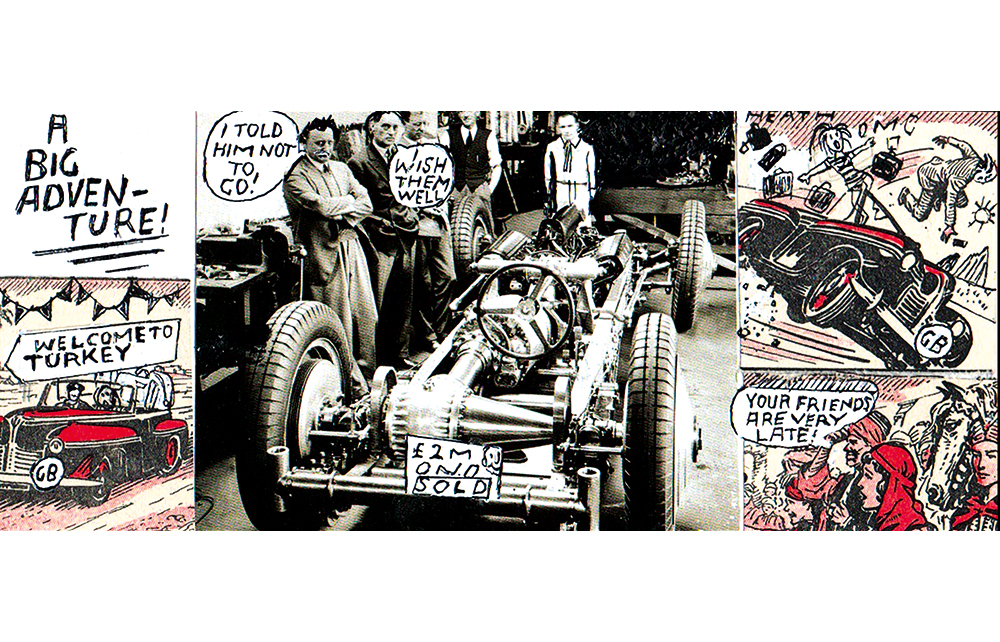‘Oh, you’ll hate it, Julia. It’s men talking about cars all the time. Really, really boring. You drive all day, it gets incredibly hot, you’ve got no air-conditioning and then – if and when you make it to your hotel – the men start talking about cars again. It’s awful. Never again.’ This is not the kind of pep talk I’m hoping for on the eve of our 6,000-mile expedition to the Syrian border with my wife in Frieda, our 1956 Bristol 405. Our friend, the novelist Raffaella Barker, knows what she’s talking about. Her husband, who sells classic cars for a living, comes to my rescue. ‘Zip it!’ he says, but the seed of doubt has been sown. Sceptical friends reckon this trip has all the makings of a divorce. In search of reassurance, I call in on Rob Kitchen, the maestro of Norfolk Classic and Sports Cars, who specialises in long-distance rally preparation. He has already worked wonders with Frieda. I ask him for his advice about travelling with my wife. ‘Leave her at home,’ he says.
In the run-up to departure, there is much technical chat, all of it male. Manuel, one of our Bristol stablemates, talks about bringing ‘a spare facet electronic pump’, which will apparently ‘bypass the AC Delco’. He will also be bringing a spare pressure regulator adjustable between 1 and 5 psi to keep our Solexes happy. There is further talk of knock sensors, pinking, skimmed heads and high-compression pistons. I have no idea what any of this means, but Raffaella’s words spring to mind.
Eighteen hundred miles later, we have made it to Istanbul without incident and in high style and spirits, though I am scarred for life after my first brush with tailgating Italian drivers. Frieda prides herself on having three ashtrays, but the absence of seatbelts and wing mirrors concentrates the mind at 75 mph. Outside Gaziantep, close to the Syrian border, the mercury rises to 37°C and it’s all too much. We judder to a halt at the bottom of a hill and sit and swelter on the hard shoulder until a Turkish good samaritan arrives to help us get moving. He then refuses to leave until he has escorted us to Zeugma Mosaic Museum, the world’s largest, a treasure trove of Greek and Roman antiquities. In central Gaziantep, we again overheat and break down, this time in the middle of heavy traffic. Strangers jump in and help push us to safety. And everywhere we go, drivers hoot and wave at us, while petrol station workers bring us free ayran, the delicious yoghurt drink. Is there a more hospitable people than the Turks?
But the mood in Turkey is sombre, to put it mildly. With inflation running at more than 80 per cent, how could it be otherwise? An entrepreneur friend calls Erdogan something unprintable. An academic refers to him as ‘Satan’. ‘He wants to get us protesting on the streets so he can send in the army and prevent elections because he knows he can’t win any other way,’ says another friend. The fact that it is dangerous to use their names is a depressing sign of the times. Read Amnesty International’s latest report on Turkey – attacks on the media, clampdowns on the opposition, severe restrictions on freedom of assembly, the use of torture – and you could be forgiven for thinking the country was sliding into dictatorship. Favourite Turkey gag. Sir Archibald Clark Kerr, His Majesty’s Ambassador to Moscow, writes a letter to Lord Pembroke, Foreign Office minister, on April 6, 1943. Amid the dark days of war, Kerr is celebrating ‘a tiny flash that has illuminated my sombre life’: the arrival of a new Turkish colleague rejoicing in the name of Mustapha Kunt. ‘We all feel like that, Reggie, now and then, especially when spring is upon us, but few of us would care to put it on our cards. It takes a Turk to do that.’
A Bristol is a thinking man’s Bentley. After more than 6,200 miles, Frieda is still flying, her engine roaring a six-cylinder symphony that has been likened to a squadron of Lancasters. We make it back dazed but in one piece. I feel like the replicant Roy, played by Rutger Hauer, in Bladerunner, who has ‘seen things you people wouldn’t believe’. Not attack ships on fire off the shoulder of Orion, but petrol vaporising on the Syrian border, fuel tanks leaking outside Gallipoli, and calamitous power loss on Turkish mountain passes. It has been the adventure of a lifetime. Nine cars each notched up around 6,000 miles, giving an unofficial world record of 54,000 miles driven by Bristols in one go. And even better, no divorce lawyers have been instructed. Astonishingly, the chief navigator is talking about a return trip by Bristol to eastern Europe.
Justin Marozzi’s latest book is The Arab Conquests: The Spread of Islam and the First Caliphates.






Comments